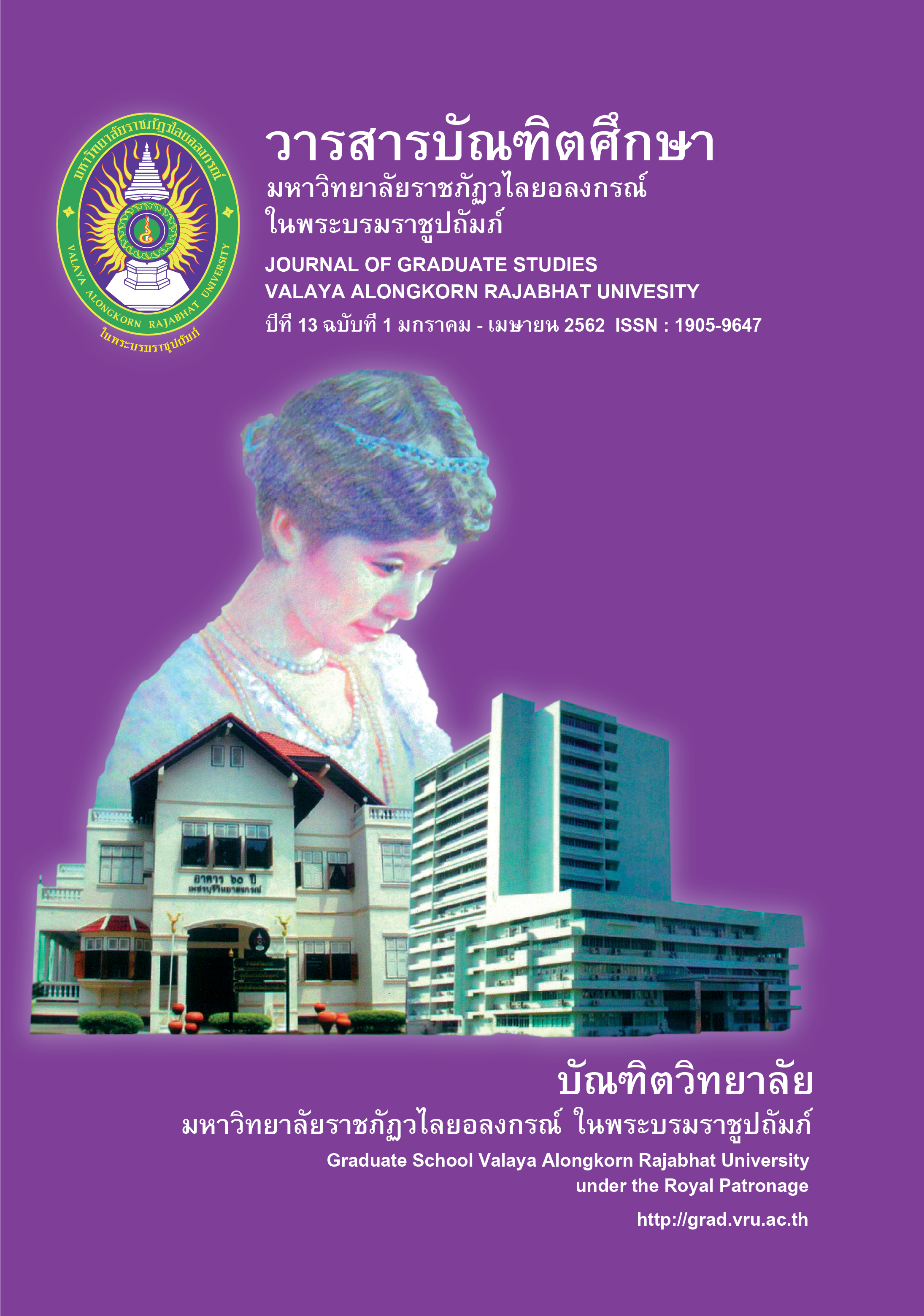THE DEVELOPMENT OF INSTRUCTIONAL MODEL TO ENHANCE INSTRUCTIONAL DESIGN COMPETENCIES FOR MEDIA PRODUCTION OF UNDERGRADUATE STUDENTS MAJORED IN EDUCATIONAL TECHNOLOGY AND COMMUNICATIONS, MAHASARAKHAM UNIVERSITY
Main Article Content
Abstract
The purposes of this study were 1) to develop instructional models to enhance instructional design competencies for media production of undergraduate students majored in Educational Technology and Communications, Mahasarakham University, 2) to study the effects of instructional design competencies for media production of the students with the developed instructional models, and 3) to study of students' satisfaction with instructional models to enhance instructional design competencies for media production. The samples of this study was 12 sophomores majored in Educational Technology And Communications, Faculty of Education, Mahasarakham University who enrolled in Instructional System Design for Media Production Course (Course No. 0503 213) in academic year 2017. Moreover, the research instruments consisted of 1) the instructional model of Community Based Learning with Design Thinking Process and using of social media for learning support, 2) the self-assessment of students’ instructional design competencies, and 3) Satisfaction Assessment Form. The data were analyzed by using Average, and Standard Deviation.
The Results of research were as follows:
- The instructional model which enhanced instructional design competencies for media production of undergraduate students majored in Educational Technology and Communications, Mahasarakham University was the instructional model of Community Based Learning with Design Thinking Process and using of social media for learning support. The instructional model consisted of 8 components which were 1) instructors, 2) students, 3) senior students, 4) coordinators, 5) medical personnel, 6) instructional strategies, 7) social media, and 8) the assessment. In addition, the instruction composed of 5 steps which were 1) introduction, 2) preparation step,
3) instruction step, 4) operation step (this step consisted of 7 sub-steps which were 4.1) analysis, 4.2) understanding, 4.3) ideation, 4.4) design, 4.5) development, 4.6) delivery, 4.7) implementation, and 5) Conclusion and Evaluation step. - Students who studied with the instructional model of Community Based Learning with Design Thinking Process and using of social media for learning support had higher level of post-learning instructional design competencies for media production in all aspects, and they also had higher development of competencies in all dimensions.
3. Students who studied with the instructional model of Community Based Learning with Design Thinking Process and using of social media for learning support had the highest satisfaction level. ( = 4.87, S.D. = 0.37).
Article Details

This work is licensed under a Creative Commons Attribution-NonCommercial-NoDerivatives 4.0 International License.
บทความทุกเรื่องได้รับการตรวจความถูกต้องทางวิชาการโดยผู้ทรงคุณวุฒิ ทรรศนะและข้อคิดเห็นในบทความ Journal of Global of Perspectives in Humanities and Social Sciences (J-GPHSS) มิใช่เป็นทรรศนะและความคิดของผู้จัดทำจึงมิใช่ความรับผิดชอบของบัณฑิตวิทยาลัย มหาวิทยาลัยราชภัฏวไลยอลงกรณ์ ในพระบรมราชูปถัมภ์ กองบรรณาธิการไม่สงวนสิทธิ์การคัดลอก แต่ให้อ้างอิงแหล่งที่มา
References
Creative Thailand. (2018). kānʻō̜kbǣp phư̄a sangkhom čhōt mai thāthāi withī khit (tō̜n thī 2) [Design for Social New problems challenge the way of thinking (Chapter 2)]. Retrieved from http://www.tcdc.or.th/creativethailand/article/Other/28365.
Kositpipat, O. (2016). kānprīapthīap phonlakā rot ʻon phān sư̄ sangkhom ʻō̜nlai læ sư̄ chumchon khō̜ng naksưksā sākhā wichā nithētsāt thī longthabīan rīan wichā prachāmati [A comparison of teaching through social media and community media communication arts students enrolled subjects public opinion]. Journal of Humanities and Social Sciences, Rajapruk University. 1(3), 81 – 91.
Koszalka, T. A., et al. (2013). Instructional Designer competencies: the standards. 4th ed. North Carolina: Information Age Publishing.
Lawang, W. & Junprasert, S. (2017). kānchai theknik kān rīanrū bǣp khrōngkān pen thān phư̄a kān sœ̄msāng thaksa hǣng satawat thī yīsipʻet khō̜ng nisit phayābān sāttra mahābandit sākhā wichākān phayābān wēt patibat chumchon [Using project-based learning to enhance 21st century skills of master’s students in nursing science program (community nurse practitioner)]. Journal of Nursing and Education. 10(2), 33 – 45.
Rojsangrat, P. (2016). kānphatthanā rūpbǣp kānsō̜n dōi chai kān khit chœ̄ng ʻō̜k bǣp pen thān phư̄a sāngsan phonngā nathī prākot ʻattalak Thai samrap nisit naksưksā radap parinyā bandit [Development of an instructional model using design thinking to create thai products identity for undergraduate students]. Doctoral dissertation. Chulalongkorn University.
Saengsuwan, J. (2014). rūpbǣp kānčhatkān rīan kānsō̜n dōi chai chumchon pen thān nai rāiwichā sưksā thūapai mahāwitthayālai Khō̜n Kǣn [Community based learning model in general education program, KKU]. Retrieved from www.ubu.ac.th/web/files_up/46f2014020510483037.pptx.
Siriphantana, C. & Uamcharoen, S. (2016). kānphatthanā prōkrǣm dōi chai chumchon pen thān nai kān rīanrū khati chon witthayā radap ʻudomsưksā [The development of community - based programe on thai folklore in higher education]. Silpakorn Educational Research Journal. 8(1), 228-238.
Srisa-ard, B. (2002). kānwičhai bư̄angton [Basic research]. 7th ed. Bangkok: Suweeriyasan
Srisuk, S. (2018). Design Thinking ' thaksa mai thī dek yuk dičhitan tō̜ng mī [Design thinking' new skills that digital kids need]. Retrieved from http://www.trueplookpanya.com/knowledge/content/67055/-parpres-par.
Tangpakdee, R. (2017). phon khō̜ng kānphatthanā samatthana kānʻō̜kbǣp kān rīan kānsō̜n phư̄a kānphalit sư̄ dōi chai rūpbǣp kānsō̜n bǣp chumchon pen thān kān rīanrū rūam kap krabūankān khit chœ̄ng ʻō̜k bǣp nai nisit radap parinyā trī sākhā theknōlōyī læ sư̄sān kānsưksā mahāwitthayālai Maha Sarakham [The effects of competency development of instructional design for media production by using instructional model of community based learning with design thinking process of undergraduate students of educational technology and communications major, mahasarakham university]. Veridian E-Journal, Silpakorn University. Thai version. Humanities, Social Sciences and Arts. 10(3), 123 – 137
Wongwanich, S. (2007). kānpramœ̄nphon kān rīanrū nǣo mai [New assessment of learning]. 2nd ed. Bangkok: Chulalongkorn University Printing House.


